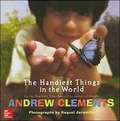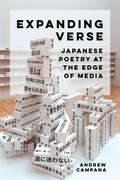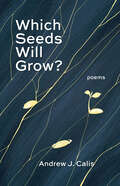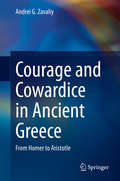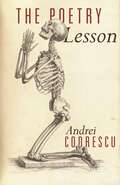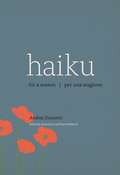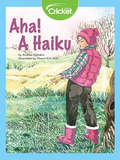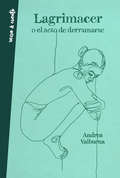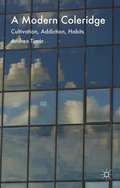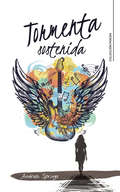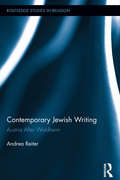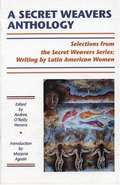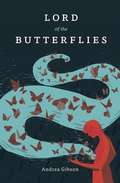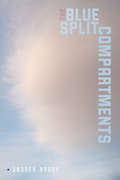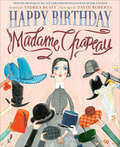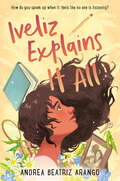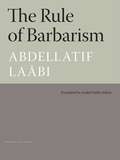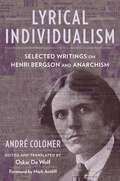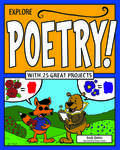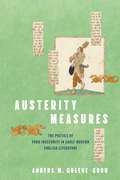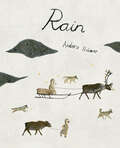- Table View
- List View
The Handiest Things in the World (Elementary Core Reading)
by Andrew ClementsNIMAC-sourced textbook
Expanding Verse: Japanese Poetry at the Edge of Media (New Interventions in Japanese Studies #6)
by Andrew CampanaA free ebook version of this title is available through Luminos, University of California Press's Open Access publishing program. Visit www.luminosoa.org to learn more.Expanding Verse explores experimental poetic practice at key moments of transition in Japan's media landscape from the 1920s to the present. Andrew Campana centers hybrid poetic forms in modern and contemporary Japan—many of which have never been examined in detail before—including the cinepoem, the tape recorder poem, the protest performance poem, the music video poem, the online sign language poem, and the augmented reality poem. Drawing together approaches from literary, media, and disability studies, he contends that poetry actively aimed to disrupt the norms of media in each era. For the poets in Expanding Verse, poetry was not a medium in and of itself but a way to push back against what new media technologies crystallized and perpetuated. Their aim was to challenge dominant conceptions of embodiment and sensation, as well as who counts as a poet and what counts as poetry. Over and over, poetic practice became a way to think about each medium otherwise, and to find new possibilities at the edge of media.
Which Seeds Will Grow?: Poems
by Andrew CalisA new collection of poems by Palestinian-American Catholic poet Andrew Calis, Which Seeds Will Grow? finds hope in the Holy Land. Grappling with his identity as a Christian Palestinian American, Andrew Calis recalls his father who saw Israeli jets swoop over his house in Jerusalem and a military helicopter fire bullets into his front yard. The same father who wouldn't teach his children Arabic, for fear that they would have accented English, who kept his past close to his chest—unknown to his son. He recounts the death of his grandfather, a grandfather who would beat his father, and for whom he could not fully mourn because Arab men don't cry. Andrew Calis digs through the pain of his family and of his homeland to find the fragile seed of contained life and delicate hope for the Holy Land—and reflects on how tenderly that seed must be nurtured. Steeped in wonder, Which Seeds Will Grow? explores the past and the present, from ancient Jerusalem to Baltimore's gardens and alleys through the lens of a Palestinian American. The poems are patient, waiting for seasons to end, waiting for space to expand outward, and waiting for light to touch the earth. Despite the difficulty of waiting, readers will find hope in hopelessness and comfort in the contemplation of the world and its sacred mysteries. From Which Seeds Will Grow? Planting a Garden Stealing clippings from neighbors' yards And smiling as they grew their own blooms In the safe and hidden rooms where we Keep watch on them like they are our children. *** Nothing grew. We knew this was A possibility, had read It sometimes takes two years, And we hoped in spite of only dirt For the green that could be anything. Perhaps we dug too shallow or too close To the shade, or stepped where we had already planted, Either crushing roots or breaking their curled First shoots before they broke the surface. *** So when one survived, wove a green line Of its own, thinly sprouting something unknowable, I ran Inside and for a moment felt What John must have felt Leaving Peter, old and unsteadily running, And running breathlessly To tell everyone — Everyone What had happened And how you wouldn't believe your eyes.
William Wordsworth in Context
by Andrew BennettWilliam Wordsworth's poetry responded to the enormous literary, political, cultural, technological and social changes that the poet lived through during his lifetime (1770‒1850), and to his own transformation from young radical inspired by the French Revolution to Poet Laureate and supporter of the establishment. The poet of the 'egotistical sublime' who wrote the pioneering autobiographical masterpiece, The Prelude, and whose work is remarkable for its investigation of personal impressions, memories and experiences, is also the poet who is critically engaged with the cultural and political developments of his era. William Wordsworth in Context presents thirty-five concise chapters on contexts crucial for an understanding and appreciation of this leading Romantic poet. It focuses on his life, circle, and composition; on his reception and influence; on the significance of late eighteenth and early nineteenth century literary contexts; and on the historical, political, scientific and philosophical issues that helped to shape Wordsworth's poetry and prose.
Courage and Cowardice in Ancient Greece: From Homer to Aristotle
by Andrei G. ZavaliyThe book offers the first comprehensive account of the debate on true courage as it was raging in ancient Greece, from the times when the immensely influential Homeric epics, the Iliad and the Odyssey, were composed, to the period of the equally influential author, Aristotle. The many voices that contribute to this debate include poets, authors of ancient dramas and comedies, historians, politicians and philosophers. The book traces the origin of the earliest ideal of a courageous hero in the epic poems of Homer (8th century BCE), and faithfully records its transformations in later authors, which range from an emphatic denial of the Homeric standards of courage (as in comedies of Aristophanes and some Dialogues of Plato) to the strong revisionist tendencies of Aristotle, who attempts to restore genuine courage to its traditional place as an exclusively martial, male virtue.Without attempting to cover the whole of the Western history, the book is able to explore the most important primary Greek sources on the subject matter in greater details, and provide the reader with a comprehensive picture of the changes in both popular and philosophical conceptualizations of the standards of courage from the Archaic period to the middle of the 4th century BCE. A deeper understanding of the history of the debate on courage should help to shape the modern discussions as well, as it becomes obvious that many of the questions on courage and cowardice that are still raised by the contemporary authors from different fields, have been thoroughly considered during the early stages of Greek culture. The book seeks to undermine a common stereotype of a single, unified view on courage and cowardice in Ancient Greece and shows that the current debates on what constitutes genuine courageous character can be traced to the various direct and indirect discussions on this subject matter by the ancient authorities.
The Poetry Lesson
by Andrei CodrescuA rollicking story of the strangest creative writing class ever—as only Andrei Codrescu could tell it"Intro to Poetry Writing is always like this: a long labor, a breech birth, or, obversely, mining in the dark. You take healthy young Americans used to sunshine (aided sometimes by Xanax and Adderall), you blindfold them and lead them by the hand into a labyrinth made from bones. Then you tell them their assignment: 'Find the Grail. You have a New York minute to get it.' "—The Poetry LessonThe Poetry Lesson is a hilarious account of the first day of a creative writing course taught by a "typical fin-de-siècle salaried beatnik"—one with an antic imagination, an outsized personality and libido, and an endless store of entertaining literary anecdotes, reliable or otherwise. Neither a novel nor a memoir but mimicking aspects of each, The Poetry Lesson is pure Andrei Codrescu: irreverent, unconventional, brilliant, and always funny. Codrescu takes readers into the strange classroom and even stranger mind of a poet and English professor on the eve of retirement as he begins to teach his final semester of Intro to Poetry Writing. As he introduces his students to THE TOOLS OF POETRY (a list that includes a goatskin dream notebook, hypnosis, and cable TV) and THE TEN MUSES OF POETRY (mishearing, misunderstanding, mistranslating . . . ), and assigns each of them a tutelary "Ghost-Companion" poet, the teacher recalls wild tales from his coming of age as a poet in the 1960s and 1970s, even as he speculates about the lives and poetic and sexual potential of his twenty-first-century students. From arguing that Allen Ginsberg wasn't actually gay to telling about the time William Burroughs's funeral procession stopped at McDonald's, The Poetry Lesson is a thoroughly entertaining portrait of an inimitable poet, teacher, and storyteller.
Haiku: For a Season | Per Una Stagione
by Andrea ZanzottoAndrea Zanzotto is one of the most important and acclaimed poets of postwar Italy. This collection of ninety-one pseudo-haiku in English and ItalianOCowritten over several months during 1984 and then revised slowly over the yearsOCoconfirms his commitment to experimentation throughout his life. "Haiku for a Season" represents a multilevel experiment for Zanzotto: first, to compose poetry bilingually; and second, to write in a form foreign to Western poetry. The volume traces the life of a woman from youth to adulthood, using the seasons and the varying landscape as a mirror to reflect her growth and changing attitudes and perceptions. With a lifelong interest in the intersections of nature and culture, Zanzotto displays here his usual precise and surprising sense of the living world. These never-before-published original poems in English appear alongside their Italian versionsOConot strict translations but parallel texts that can be read separately or in conjunction with the originals. As a sequence of interlinked poems, "Haiku for a Season" reveals Zanzotto also as a master poet of minimalism. ZanzottoOCOs recent death is a blow to world poetry, and the publication of this book, the last that he approved in manuscript, will be an event in both the United States and in Italy. a"
Aha! A Haiku
by Andrea VlahakisLearn more about haiku, which are short poems, written in a style created in Japan more than 400 years ago.
Lagrimacer o el acto de derramarse
by Andrea ValbuenaUn poemario que habla de lo necesario de las despedidas y de la tristeza como acto natural. Un grito que se rebela ante la necesidad actual que nos han impuesto de la felicidad perpetua. «Cada uno de estos poemas es una lágrima. Pequeñas cápsulas redondas y saladas de versos que también se derraman, que brotan, que caen y se escapan de un ojo o a través de un lapicero sujeto por una mano temblorosa. Una mano que escribe y llora, y sabe que de la tristeza también nacen cosas, buenas o malas, pero frecuentemente bellas». La poeta Andrea Valbuena hace en estas páginas un alegato a favor de la tristeza como estado natural y necesario y del duelo como mercromina para el dolor, y nos invita a volver a dar valor a la palabra «lagrimacer» y al acto que denota. La palabra como rebelión y como espejo, llorar sin vergüenza para poder volver a reír. La crítica ha dicho...«Empezó publicando en las redes y ahora es uno de los referentes de la nueva poesía.»ABC «Escribe versos para las mujeres que necesitan recordarse, que son hermosas y eligen quererse a sí mismas antes que a cualquier persona.»El Mundo
A Modern Coleridge
by Andrea TimárA Modern Coleridge shows the interrelatedness of the discourses of cultivation, addiction and habit in Coleridge's poetry and prose, and argues that these all revolve around the problematic nexus of a post-Kantian idea of free will, essential to Coleridge's eminently modern idea of the 'human'.
Tormenta sostenida
by Andrea SpringsTodas las canciones hablan de ti. La primera canción nunca se olvida. Se guarda en un rincón, apartada, sin interferir en tu vida, hasta que, de nuevo y por pura casualidad, vuelves a escucharla; y te hace sonreír y se te atragantan los recuerdos y personas asociadas a ella. <P><P>La música tiene el poder de hacer sentir. Esto lo descubrí hace años, cuando la niña que fui se subía al pequeño escenario cada Navidad. Lo que no sabía es que, con el tiempo, la música me salvaría de nuevo. Hace tiempo que necesito escribir lo que mi voz no es capaz de pronunciar, las tormentas que todos llevamos y unos son capaces de verbalizar y otros, como yo, necesitamos escribirlas para sostenernos. <P><P>En este libro te empaparás del agua salada que rodea mi vida que, como el mar Cantábrico, la primera impresión es un témpano de hielo, pero solo hace falta quedarse un rato para desmontar la coraza.
Contemporary Jewish Writing: Austria After Waldheim (Routledge Studies in Religion #33)
by Andrea ReiterThis book examines Jewish writers and intellectuals in Austria, analyzing filmic and electronic media alongside more traditional publication formats over the last 25 years. Beginning with the Waldheim affair and the rhetorical response by the three most prominent members of the survivor generation (Leon Zelman, Simon Wiesenthal and Bruno Kreisky) author Andrea Reiter sets a complicated standard for ‘who is Jewish’ and what constitutes a ‘Jewish response.’ She reformulates the concepts of religious and secular Jewish cultural expression, cutting across gender and Holocaust studies. The work proceeds to questions of enacting or performing identity, especially Jewish identity in the Austrian setting, looking at how these Jewish writers and filmmakers in Austria ‘perform’ their Jewishness not only in their public appearances and engagements but also in their works. By engaging with novels, poems, and films, this volume challenges the dominant claim that Jewish culture in Central Europe is almost exclusively borne by non-Jews and consumed by non-Jewish audiences, establishing a new counter-discourse against resurging anti-Semitism in the media.
A Secret Weavers Anthology: Selections from the White Pine Press Secret Weavers Series (Secret Weavers Series #13)
by Andrea O’Reilly HerreraA selection of work from all twelve volumes of the critically-acclaimed and successful Secret Weavers series.
Lord of the Butterflies
by Andrea GibsonAndrea Gibson’s latest collection is a masterful showcase from the poet whose writing and performances have captured the hearts of millions. With artful and nuanced looks at gender, romance, loss, and family, Lord of the Butterflies is a new peak in Gibson’s career. Each emotion here is deft and delicate, resting inside of imagery heavy enough to sink the heart, while giving the body wings to soar.
Take Me With You
by Andrea GibsonFor readers of Rupi Kaur (Milk and Honey) and Cheryl Strayed, a book small enough to carry with you, with messages big enough to stay with you, from one of the most quotable and influential poets of our time. <P><P>Andrea Gibson explores themes of love, gender, politics, sexuality, family, and forgiveness with stunning imagery and a fierce willingness to delve into the exploration of what it means to heal and to be different in this strange age. Take Me With You, illustrated throughout with evocative line drawings by Sarah J. Coleman, is small enough to fit in your bag, with messages that are big enough to wake even the sleepiest heart. Divided into three sections (love, the world, and becoming) of one liners, couplets, greatest hits phrases, and longer form poems, it has something for everyone, and will be placed in stockings, lockers, and the hands of anyone who could use its wisdom.
The Blue Split Compartments (Wesleyan Poetry Series)
by Andrea BradyThe Blue Split Compartments is a complex and powerful sequence of lyric poems exploring how the physically intimate relationships between military drone operators and their victims are mediated, not only through the technological interfaces of the screen and drone, but also through language and subjectivity. Drawing on chatroom logs, military policy manuals, pattern of life archives, and accounts by witnesses around the world, these poems document the consequences of the perpetual and 'everywhere war' conducted from remote airbases, where pilots in shipping containers surveil and destroy remote 'objects'. Brady's approach offers a sophisticated interplay of diction, rhetoric, syntax, positioning, allusion, and sonic quality that generates legible currents of meaning and orientation. Entire countries have been turned into 'open air prisons', where the buzzing of drones overhead induces profound trauma and changes to social life. These poems strafe a documentary history of drone warfare with personal memory, and reflections on the myths and mechanics of prosthetic violence, voyeurism, masculinity, and desire. The Blue Split Compartments is a bitter comedy in drone erotics, a devastating reach into the twisted soul of murderous techno-surveillance regimes, a linguistically virtuosic and deeply humane x-ray of the discursive and militaristic systems that join us in mutual dissolution.
Happy Birthday, Madame Chapeau
by Andrea Beaty&“An eminently stylish tale&” from the creators of Ada Twist, Scientist, the #1 New York Times bestseller that&’s now a Netflix series (Publishers Weekly). In a three-story house with a shop down below,lived the world&’s finest hat maker, Madame Chapeau.Like the Lady herself, all her hats were refined.Brilliantly singular. One of a kind. So begins the tale of a lonely hat maker who matches customers to the perfect hat but lacks her own perfect match in life. Once a year, on her birthday, Madame Chapeau ventures out in her favorite bonnet to dinner. This time, a crow snatches her hat and flies away. Mon dieu! As she chases the crow through the streets of Paris, a baker, a policeman, a cowboy, and others offer her their own hats to wear. None of them are quite right, though, until one special little girl offers her a hat &“knitted with love and [her] best birthday wish.&” From the bestselling team behind Iggy Peck, Architect and Rosie Revere, Engineer comes this delightful and very stylish story about love, community, and friendship, with some fancy hats thrown in for good measure. &“Beaty carries the bounces and lilts to the very last page. Roberts&’ colorful, exaggerated hats (many of which are modeled on real designs) whimsically adorn the multicultural Parisian public . . . The underlying suggestion that no one is as alone as they believe is lovely enough, but the fun of reading this aloud elevates it even more.&” —Kirkus Reviews
Sofia Valdez, Future Prez
by Andrea BeatyEvery morning, Abuelo walks Sofia to school until one day, when Abuelo hurts his ankle at a local landfill and he can no longer do so. Sofia misses her Abuelo and wonders what she can do about the dangerous Mount Trash more. Then she gets an idea the town can turn the slimy mess into a park. She brainstorms and plans and finally works up the courage to go to City Hall only to be told by a clerk that she can’t build a park because she’s just a kid. Sofia is down but not out, and she sets out to prove what one kid can do.
Iveliz Explains It All: (Newbery Honor Award Winner)
by Andrea Beatriz ArangoHow do you speak up when it feels like no one is listening? In this moving novel in verse that Printz Honor-winning author Lisa Fipps calls "powerful," one girl takes on seventh grade while facing mental health challenges, and must find her voice to advocate for the help and understanding she deserves.Listen up:The end of elementary school?Worst time of my life.And the start of middle school?I just wasn&’t quite right.But this year?YO VOY A MI.Seventh grade is going to be Iveliz&’s year. She&’s going to make a new friend, help her abuela Mimi get settled after moving from Puerto Rico, and she is not going to get into any more trouble at school. . . .Except is that what happens? Of course not. Because no matter how hard Iveliz tries, sometimes people say things that just make her so mad. And worse, Mimi keeps saying Iveliz&’s medicine is unnecessary—even though it helps Iveliz feel less sad. But how do you explain your feelings to others when you&’re not even sure what&’s going on yourself?Powerful and compassionate, Andrea Beatriz Arango&’s debut navigates mental health, finding your voice, and discovering that those who really love you will stay by your side.
Grey All Over
by Andrea Actis“Please stay with me, please stay here, please cause poltergeists in my stupid apartment…” Late in the evening of December 13, 2007, Andrea Actis found her father, Jeff, facedown dead in her East Vancouver apartment. So began her passage through grief, self-reckoning, and graduate school in Providence, Rhode Island, where the poetics she studied (and sometimes repudiated) became integral to her gradual reconstruction of wholeness. An assemblage of “evidence” recovered from emails about paranormal encounters sent and received by Jeff (greyallover@yahoo.com), junk mail from false prophets, an annotated excerpt from Laura (Riding) Jackson’s “The Serious Angels: A True Story,” and transcripts of Actis’ dreams, conversations, and messages to the dead, Grey All Over not only celebrates a rare, close, complicated father-daughter bond, it also boldly expands the empathetic and critical capacities of poetry itself. In pulling us outside the comfort zones of received aesthetics and social norms, Actis asks us to embrace with whole seriousness “the pragmatics of intuition” in all the ways we read, live, and love. “When a loved one dies, there’s all this stuff to deal with, and in the midst of grief we begin to collect, sort, document, store, and discard. Andrea Actis has taken the stuff surrounding her father’s death and created a book that is, like grief, in turns heartbreaking, wise, chaotic, drunk, wry, and always unflinchingly honest. This powerful testament of survival is for anyone who has felt the ‘déjà vu in reverse’ of grief. It is for the living.” —Sachiko Murakami, author of Render “Love letter, experimental poem, meditation, conversation with the dead—Andrea Actis’s compelling debut is unlike any memoir I’ve ever read. In one passage, Actis digs out the biggest piece of bone she can find in the vessel of her father’s ashes and gently bites on it. Reading Grey All Over I had a similar sensation. Ash. Bone. Love.” —Jen Currin, author of Hider/Seeker “This absolutely beautiful work makes plain that seriousness feels like love.” —Aisha Sasha John, author of I have to live.
The Rule of Barbarism: Pirogue Poets Series
by Abdellatif Laabi Andre Naffis-SahelyFinally available in English, Le Règne de la barbarie by Abdellatif Laâbi is one of the most daring poetic visions of the second half of the twentieth century. First published in 1976 when Laabi was serving an eight-year prison sentence (1972-1980) for 'crimes of opinion' against the Moroccan State, The Rule of Barbarism is a devastating flight through consciousness, acquainting the reader with the trials of a society caught between a colonial past and the tragic realities of a brutal dictatorship. Analysing the presence of 'barbarism' inherent in all of us, and yet deepening our capacity for compassion despite the allure of revenge, this stunning debut from a writer on the threshold of a groundbreaking career can be read as an epic of love, empathy, anger and despair--and is as resonant today as when composed nearly fifty years ago.
Lyrical Individualism: Selected Writings on Henri Bergson and Anarchism (Columbia Themes in Philosophy, Social Criticism, and the Arts)
by Andre ColomerIn the early twentieth century, André Colomer was perhaps the best-known figure in the anarchist movement. A poet, philosopher, activist, and public speaker, he was enmeshed in the Parisian political and artistic scene at a time of political and cultural revolution. Amid the avant-garde explosions of Cubism, futurism, and surrealism and the ferment of radical politics on left and right, Colomer became anarchism’s leading advocate. He galvanized the Parisian public through his agitational writing and organizing, as well as his involvement in a sensational murder case, while developing a distinctive philosophical account of anarchist individualism. Yet Colomer died in obscurity in Moscow, abandoned by his friends and comrades, and is scarcely known in the English-speaking world today.Lyrical Individualism presents a selection of Colomer’s crucial writings, with a focus on anarchist theory and the philosophy of Henri Bergson. It reveals the richness of Colomer’s philosophical work, particularly his creative engagement with Bergson, Max Stirner, and Friedrich Nietzsche to forge a novel anarchist ideology. Colomer’s writings not only offer valuable insights into interwar anarchism, they also present a distinctive philosophical vision that in many ways anticipates theories and debates animating radical political movements today. This book also showcases his acerbic and pugnacious political commentary on the turbulent events of the 1910s and 1920s. The first translation and publication of Colomer’s work since his untimely death in 1931, Lyrical Individualism allows a range of readers to discover this vital thinker.
Explore Poetry!
by Andi DiehnPoems can be silly, serious, or fun, just like kids! Whether it’s the sing-song rhythm of a limerick, the serendipitous magic of a found poem, the deceptive simplicity of a haiku, or the easy familiarity of an acrostic poem, children are charmed by poetry. And what’s more fun than reading poetry? Writing it! In Explore Poetry! With 25 Great Projects children have fun learning about different forms of poetry while delving into different literary techniques such as personification, metaphor, and alliteration, all of which are discussed in a simple and accessible way. Activities include creative writing exercises designed to reinforce language arts skills, plus art projects that encourage children to visualize concepts and definitions. Short biographies of important poets reinforce the concept of poetry as an important part of society. Explore Poetry! meets Common Core State Standards for language arts; Guided Reading Levels and Lexile measurements indicate grade level and text complexity. Informational and inspiring, Explore Poetry! fits seamlessly into the poetry curriculum of grades 2 to 4 and serves as an enrichment resource all during the school year, especially April, Poetry Month.
Austerity Measures: The Poetics of Food Insecurity in Early Modern English Literature
by Anders M. Greene-CrowExplores how early modern writers used poetry to fight food insecurityAusterity Measures explores how early modern writers used poetic form as a tool to fight extreme food insecurity. Authors such as Thomas Tusser, George Herbert, Robert Herrick, Anne Bradstreet, and Thomas Tryon witnessed the privatization of public farmland, rising food prices amidst uncontrolled inflation, mass starvation in nascent North American colonies, and the racist violence of the Caribbean plantation slavery system. Anders M. Greene-Crow shows how these authors experimented with literary form in an effort to change readers’ beliefs and behaviors with regard to food ethics.By examining this history, Greene-Crow sheds new light on both modern-day food ethics and activism’s place in literary writing. This book traces how authors’ solutions to food insecurity turned away from structural models of communal care and toward the now-dominant consumer-capitalist model championing individual dietary choice. Simultaneously, he reveals why literary criticism began to discount literature’s power as a tool for social change. The New Critical school, whose close reading methodology dominates literary analysis, arose out of Southern Agrarianism, a movement that sought to return the South to antebellum structures of racial hierarchy and labor exploitation that took shape in the early modern period. These intersectional labor politics underlie close reading, continuing to limit critics’ understanding of how literary form produces social change, and reinforcing the scarcity culture of literature departments today.By recovering poetry’s role as a force for affecting readers’ relationship to one of their most basic needs—the need to eat—Austerity Measures develops an alternative methodology that takes writers’ material conditions into account in analyzing form.
Rain
by Anders HolmerA poetry collection celebrating the wonders of the natural world This haiku collection will enchant both nature lovers and budding poets. The spare, lyrical text describes a series of short vignettes, each of them taking place in a different kind of rain, from thunderstorms to falling flower petals. The poems—some serious, some gently humorous—depict scenes from all over the globe: a horse struggling to plow a field, a father changing a tire while his children play, and two friends making up after a fight. With its majestic artwork, this introduction to a classic poetic form will inspire readers to write their own haiku as they experience the amazing world around them.
